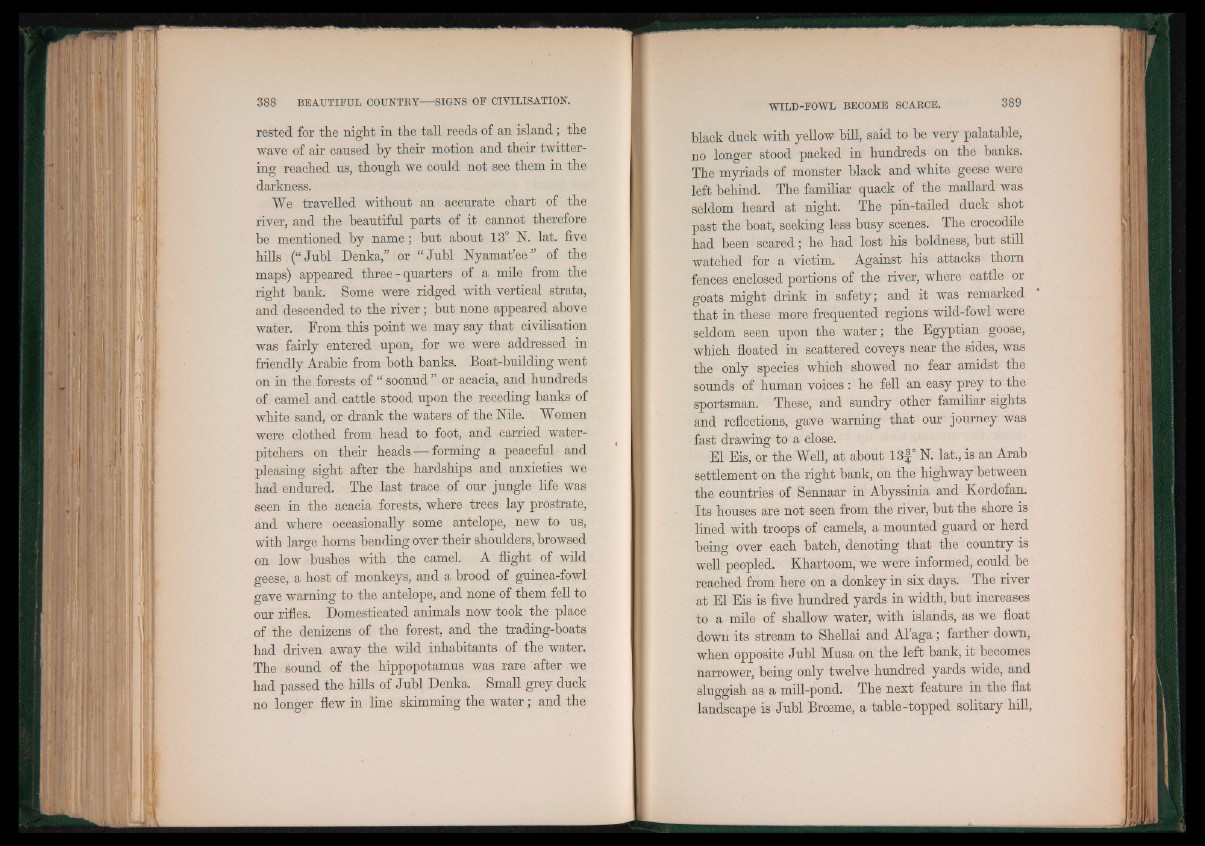
rested for the night in the tall reeds of an island; the
wave of air caused by their motion and their twittering
reached us, though we could not see them in the o 3 o
darkness.
We travelled without an accurate chart of the
river, and the beautiful parts of it cannot therefore
he mentioned by name; but about 13° N. lat. five
hills (“ Jubl Denka,” or “ Jubl Nyamat’ee” of the
maps) appeared three-quarters of a mile from the
right bank. Some were ridged with vertical strata,
and descended to the river; but none appeared above
water. From this point we may say that civilisation
was fairly entered upon, for we were addressed in
friendly Arabic from both banks. Boat-building went
on in the forests of “ soonud” or acacia, and hundreds
of camel and cattle stood upon the receding banks of
white sand, or drank the waters of the Nile. Women
were clothed from head to foot, and carried water-
pitchers on their heads — forming a peaceful and
pleasing sight after the hardships and anxieties we
had endured. The last trace of our jungle life was
seen in the acacia forests, where trees lay prostrate,
and where occasionally some antelope, new to us,
with large horns bending over their shoulders, browsed
on low bushes with the camel. A flight of wild
geese, a host of monkeys, and a brood of guinea-fowl
gave warning to the antelope, and none of them fell to
our rifles. Domesticated animals now took the place
of the denizens of the forest, and the trading-boats
had driven away the wild inhabitants of the water.
The sound of the hippopotamus was rare after we
had passed the hills of Jubl Denka. Small grey duck
no longer flew in line skimming the water; and the
black duck with yellow bill, said to be very palatable,
no longer stood packed in hundreds on the banks.
The myriads of monster black and white geese were
left behind. The familiar quack of the mallard was
seldom heard at night. The pin-tailed duck shot
past the boat, seeking less busy scenes. The crocodile
had been scared; he had lost his boldness, but still
watched for a victim. Against his attacks thorn
fences enclosed portions of the river, where cattle or
goats might drink in safety; and it was remarked
that in these more frequented regions wild-fowl were
seldom seen upon the water; the Egyptian goose,
which floated in scattered coveys near the sides, was
the only species which showed no fear amidst the
sounds of human voices : he fell an easy prey to the
sportsman. These, and sundry other familiar sights
and reflections, gave warning that our" journey was
fast drawing to a close.
El Eis, or the Well, at about 13f° N. lat., is an Arab
settlement on the right bank, on the highway between
the countries of Sennaar in Abyssinia and Kordofan.
Its houses are not seen from the river, but the shore is
lined with troops of camels, a mounted guard or herd
being over each batch, denoting that the country is
well peopled. Khartoom, we were informed, could be
reached from here on a donkey in six days. The river
at El Eis is five hundred yards in width, but increases
to a mile of shallow water, with islands, as we float
down its stream to Shellai and Al’aga; farther down,
when opposite Jubl Musa on the left bank, it becomes
narrower, being only twelve hundred yards wide, and
sluggish as a mill-pond. The next feature in the flat
landscape is Jubl Broeme, a table-topped solitary hill,